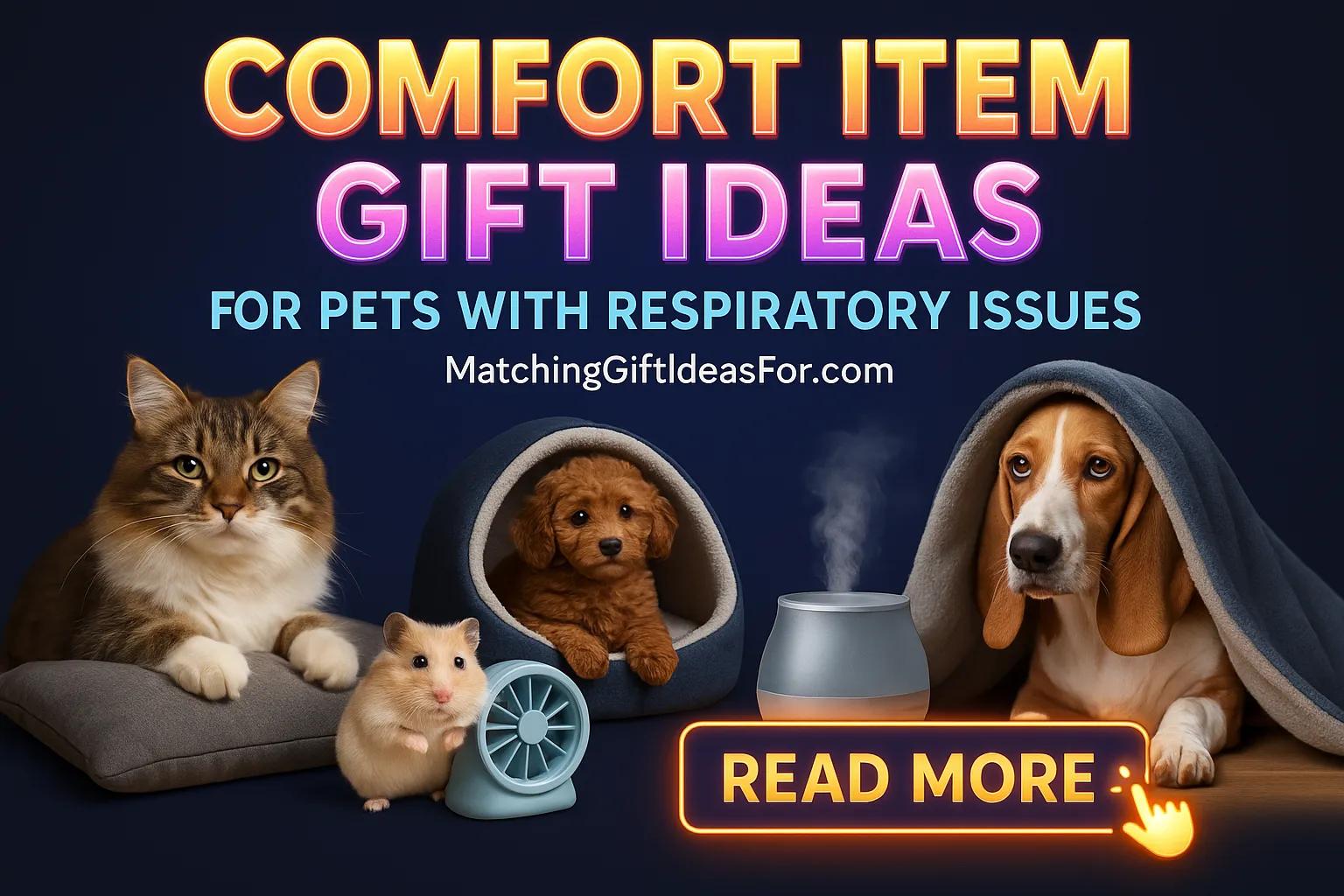Finding the right comfort gifts for pets with respiratory issues means focusing on cozy items that put less strain on breathing and help keep your furry pals calmer. As someone who’s walked this path with a snub-nosed pup, I know that comfort isn’t just about fluffy beds. It’s about smart choices, thoughtful accessories, and practical care strategies. Here you’ll find some of my top suggestions for soothing essentials, cool accessory ideas, and thoughtful touches that pet owners and animal lovers can both appreciate.
Why Comfort Matters for Pets with Respiratory Issues
Pets with sensitive airways, like cats battling asthma or dogs dealing with allergies, face their own set of daily hurdles. Even something as simple as dust or a whiff of strong scent can set off coughing or sneezing spells, which isn’t fun for them or their humans. Creating a safe, soothing space makes their lives much easier. The right comfort items do more than simply pamper. They can genuinely help pets breathe better and stay relaxed.
Respiratory problems for pets aren’t especially rare. Both cats and dogs can have chronic coughs, wheezing, or runny noses from many causes, including environmental allergies, dust, mold, and even stress. That’s why picking gifts made with their unique sensitivities in mind is really important. A cozy atmosphere supports their overall wellness and ease.
What Makes Respiratory-Friendly Comfort Important for Pets?
Respiratory issues in pets aren’t rare, especially in flat-faced breeds like bulldogs, pugs, and Persian cats or in older animals. Problems like asthma, allergies, or chronic sniffles can flare up from dry air, dust, or even stress. Making life cozier for these pets helps them breathe easier and also eases daily stress for owners. Focusing on gentle, supportive gifts can make a real difference.
Comfort items for pets with respiratory trouble go beyond regular toys or beds. The goal is to support unrestricted, calm breathing, soothe nerves, and avoid stuff that could trigger symptoms. I’ve seen how just a few simple changes – like switching to a hypoallergenic bed or running a quiet humidifier in my dog’s favorite room – can help everyone relax a little more.
Cozy Comfort Essentials for Easier Breathing
Prioritizing gentle, plush, and low-allergen materials can really help pets stay comfy without irritating delicate airways.
Here are my favorite comfort essentials for pets with respiratory sensitivities:
- Hypoallergenic Pet Beds: Choose beds made from natural fibers like organic cotton or tight-weave, dust mite–resistant fabrics. Memory foam offers joint support while minimizing allergens. Removable, washable covers make cleaning easy and help keep your pet’s bed fresh and long-lasting.
- Soft and Snuggly Blankets: Opt for tightly woven, low-pile fabrics like bamboo or fleece, which are gentle on pets’ noses and skin. Plush throw blankets enhance comfort and warmth during chilly days. Choose hypoallergenic or organic cotton for better breathability.
- Supportive Pillows: A gently sloped pillow or bolster can raise a pet’s head slightly, making breathing less work. This was a game changer for my older cat; she loved curling up with her chin slightly elevated.
- Calming Cuddly Toys: Choose plushies filled with catnip for cats or lavender for dogs, providing comfort without heavy scents or synthetic fillers. Ensure catnip is used exclusively for cats, as dogs typically don’t respond to it. Opt for soft, washable toys made from high-quality materials that can withstand frequent cleaning, preventing allergens from lingering and avoiding loose stuffing or shedding synthetic fur.
Air Quality Helpers and Accessories
Fresh air and the right environment really matter for animals with sensitive lungs. The best gifts often go beyond what your pet can snuggle with and focus on the general air quality in the home.
- Pet-Safe Humidifiers: Dry air can trigger coughing and congestion, especially in winter. A small, whisper-quiet humidifier placed near your pet’s favorite spot helps keep airways comfortable. Look for models that don’t produce white dust and are easy to clean.
- HEPA Air Purifiers: These gadgets trap dander, dust, and pollen, keeping the air fresh and reducing sneezing for both pets and humans. I run one year-round – my dog hates sneezing as much as I do. Go for models noted for quiet operation and no heavy ozone output, since that can make breathing troubles worse for pets. Make sure the filter is labeled “True HEPA” for best results.
- No-Scent Air Sprays: Skip room sprays or diffusers with strong oils. If you want to freshen up the room, look for odor-neutralizing sprays that are free of chemicals and fragrances.
- Low-Dust Litter (for Cats): Regular clay litter can make cats cough and sneeze. Corn- or wheat-based natural litters mean less dust and fewer issues.
- Pet-Friendly Houseplants: Certain plants like Boston Fern or Spider Plant help soak up minor toxins, but stick with nontoxic varieties only. Even curious pets who like to nibble will be safer this way.
- Avoiding Scents: Skip candles, incense, and plug-in air fresheners. Instead, open windows when possible or use pet-safe, unscented cleaning sprays for a truly clean, pet-friendly home.
Smart gadgets like humidity monitors or even a small desktop fan that circulates air gently can also help. Keeping pet care areas dust-free with regular vacuuming, ideally with a HEPA vacuum head, goes a long way too.
Thoughtful Wellness Gifts That Can Help Sensitive Pets
Beyond bedding and air purifiers, enjoying a pet’s company also means looking after their all-around well-being. Wellness gift ideas for respiratory-sensitive pets focus on making daily life easier and more stress-free.
Here are some ideas:
- Elevated Pet Bowls: Eating or drinking at floor level can be tough for pets who are prone to coughing fits or have difficulty breathing, especially older cats and dogs. Raised bowls lower the chance of choking and make mealtime smoother.
- Gentle Grooming Brushes: Regular brushing keeps dander and loose fur in check. Pick soft, silicone-tipped brushes that won’t irritate the skin or kick up too much fur and dust.
- Natural Paw and Nose Balms: Nonmedicated balms keep skin hydrated, especially if you live in a dry climate or use indoor heating that pulls moisture from the air.
- Calming Sprays or Diffusers: Herbal, alcohol-free sprays with mellow ingredients like chamomile or valerian help soothe anxious pets, minus any strong synthetic fragrances. Test a little bit first in a well-aired space to make sure it’s right for your pet.
Most of these are easy upgrades for everyday routines, but they really help keep triggers at bay and support a pet’s comfort and sense of security. A little extra care here goes a long way.
Calming Accessories for Relaxation
Anxious pets often have more respiratory flare-ups. Comfort items that encourage relaxation can help with smoother breathing and keep pets happier overall.
- Weighted Calm Vests: These vests give gentle, comforting pressure, kind of like a hug. They calm nerves, which can help reduce panting and rapid breathing from mild anxiety.
- Antianxiety Beds: Those donut-shaped or deeply bolstered beds are favorites for many pets. They offer a sense of security that helps settle both body and mind.
- Sound-Muffling Crate Covers: If your pet gets stressed from noise, a breathable crate cover or sound-dampening blanket can offer a cozy hideaway. Just make sure the cover is made of light fabric to keep things safe and cool.
- Pheromone Diffusers: Plugin products that mimic certain calming pheromones can be helpful. Choose diffusers made for pets with no added fragrances to cut down on irritants.
Extra Touches for Day-to-Day Pet Comfort
The little things often make the biggest difference when supporting a pet with sensitive lungs.
Try some of these thoughtful tricks:
- Keep windows closed during pollen surges or spring cleaning sessions to limit irritants coming inside. Using window screens with tight mesh also adds an extra barrier without blocking fresh air fully when you do crack a window.
- Create an allergy-free room for your pet – just one small room where shoes, bags, and outdoor clothing stay outside. Fill it with comfy bedding, favorite toys, and low light to soothe nerves during allergy season.
- Avoid wool or feather bedding that can shed or trap dust. Instead, microfiber or organic cotton works wonders and stands up to more frequent washing.
- For tricky weather, pet cooling mats in summer or heated pads for winter help regulate comfort without making breathing harder. Both options are safer and less irritating than running central HVAC constantly.
Being mindful of your cleaning routine, the materials you choose, and even your home’s airflow will all play a part in setting up a truly cozy and easy-breathing hideout for your pet.
Tips for Pet Owners Supporting Respiratory Health
Gift-giving is great, but daily routines and care choices matter a lot too.
Here are some practical tips I stick with (and always suggest to others):
- Frequent Washing: Regularly clean bedding, covers, and plush toys. Hot water helps kill dust mites and remove saliva, dander, and other stuff that can make things worse for pets with allergies.
- Keep Calm: Avoid heavy perfumes, incense, strong-scented cleaners, or cigarette smoke indoors. Even new carpet or upholstery smells can bug sensitive noses.
- Short Play Sessions: Short puzzle games or gentle play keep pets active without leaving them out of breath. For dogs with trouble breathing, I stick to nose work games or casual strolls.
- Monitor Weather and Air Quality: Hot, humid weather or high pollen counts can make things harder for sensitive pets. On tough days, schedule outside time for cooler mornings or evenings, and consider keeping pets indoors when air quality is low.
Besides these, always keep water accessible and check with your vet for up-to-date advice tailored for your pet’s specific needs. Each animal is unique—some may even benefit from teaching slow-breathing games or relaxation techniques, much like people do.
Gift Ideas for Fellow Animal Lovers
If you’re shopping for a pet owner who cares for a pet with respiratory issues, thoughtful gifts can really show you care.
Here are a few unique and practical picks:
- Personalized Pet Blankets: A cozy, machine-washable blanket with the pet’s name or a cute pattern is both practical and heartfelt.
- Custom Food and Water Bowls: Bowls that are slightly elevated make eating and drinking easier for pets who can’t lower their heads as much. Go for ceramic or stainless steel for easy cleaning.
- Books on Pet Respiratory Health: A well-reviewed book with advice about supporting pets with asthma or allergies is a thoughtful and resourceful gift for any pet parent who wants to learn more.
- Pet-Safe Cleaning Supplies: Gift packs of fragrance-free, non-toxic cleaning sprays make it much easier to keep spaces tidy without extra worry.
- Donations to Animal Charities: If the pet family already has everything, a donation to a rescue or foundation for animals with medical issues makes for a super thoughtful gift that keeps giving.
I always try to include a handwritten card saying you’re thinking of their pet’s comfort. It’s a simple gesture that feels really personal.
Shopping Guide: What to Look for in Pet Gifts for Respiratory Sensitivities
Picking presents for a sensitive pet?
Keep these things in mind to make sure your choices are truly pet-friendly:
- Material Safety: Reach for natural, untreated materials that don’t have added fragrances, chemicals, or preservatives. These can irritate airways and just aren’t worth the risk.
- Ease of Cleaning: Items that are easy to machine wash trump plush or bedding that traps dust. Efficient cleaning stops allergens from building up and keeps the space fresher.
- Noise Level: Some gifts, like air purifiers or automatic feeders, create background noise. Seek out “whisper quiet” or “low decibel” models for maximum comfort.
- Pet Size and Type: Pick gear that matches your pet’s breed and stage in life. Small animals need soft, light gear, while older pets often benefit from extra support and gentleness.
- No Overpowering Smells: Even “natural” gifts can come with a scent. If you aren’t sure, play it safe and stick with fragrance-free items so respiratory flare-ups don’t sneak up unexpectedly.
Reading reviews and checking out product certifications can provide extra peace of mind. I often look for items that get a thumbs up from veterinarians or pet parents handling similar health needs. PetMD and the American Lung Association both have helpful guides if you’d like a second opinion before buying.
Dealing with Common Challenges
Even once you’ve picked good items, you might hit a few speed bumps. Here are some common issues with practical fixes I’ve learned along the way:
Managing Dust and Dander
Regular, gentle cleaning of both pet areas and the items themselves helps keep irritants down. Hardwood floors make daily sweeping easier than carpet, and putting soft bedding in the washer every week or two really pays off. A lint roller is perfect for a quick touch-up between deep cleaning sessions.
Handling Medication or Supplement Storage
If your pet needs daily meds or supplements, having a pretty, organized storage box for inhalers, pills, or sprays will smooth daily routines for everyone at home. Keeping everything together can help avoid missed doses and keep things less chaotic.
Weather Woes
Changing weather, whether it’s dry, cold, or extra humid, can make respiratory symptoms worse. In drier months, a humidifier (when cleaned regularly) may help. Always use distilled water and ask your vet for the best strategies for your pet’s particular needs.
Cool Gift Ideas for Pet Owners
The best gifts sometimes support the whole crew.
Here are a few options that show you care about both the pet and their favorite humans:
- Pet-Themed Cleaning Kits: A bundle of high-quality, fragrance-free sprays, lint rollers, reusable mop pads, and unscented laundry soap is practical and always a hit.
- Pet Parent Journals: Tracking medications, symptoms, and fun stories or wins helps keep everyone organized (and makes vet visits less stressful).
- Houseplant Starter Sets: If your recipient likes plants, a pack of safe, pet-friendly greenery brightens up any room and helps naturally boost air quality.
These thoughtful choices help overworked pet parents feel seen and supported. Sometimes, practical care beats even the most eye-catching toys.
Common Questions About Comfort for Respiratory-Sensitive Pets
When supporting pets with breathing troubles, several frequently asked questions arise.
Here are some of the most common inquiries from friends and readers, along with quick answers to help shoppers looking for gifts for these sensitive pets:
Question: What kind of bed is best for a pet with respiratory issues?
Answer: Memory foam beds with a hypoallergenic cover are a winner. Look for beds with removable, washable covers, and avoid ones with strong chemical smells or fillers.
Question: What bedding works best for asthmatic cats or coughing dogs?
Answer: Choose tightly woven, natural-fiber bedding with removable covers. Avoid foam products with chemicals you can’t identify. Washing every week or two cuts down on allergens and dust.
Question: Are air purifiers safe for pets?
Answer: Most HEPA purifiers work well as long as you change filters regularly. Steer clear of models that create ozone or heavily ionize air, as these can make breathing harder for cats in particular.
Question: Is it safe to use essential oils in my home?
Answer: It’s better to skip essential oil diffusers entirely for homes with respiratory-sensitive pets. Even oils labeled “pet-safe” can still be irritating to airways, especially with cats and birds.
Question: Can calming sprays make breathing problems worse?
Answer: Water-based, herbal sprays are generally safe. Double-check for artificial fragrances or alcohol, and always do a test run in a small, well-aired area. Watch your pet closely for discomfort before trying more.
Question: How often should I clean my pet’s bedding and toys?
Answer: Washing at least once a week helps cut down on dust and allergens. More often if your pet is having a flare-up or you’ve recently cleaned the rest of the house.
Wrapping Up: Prioritizing Comfort Makes a Difference
Gifting comfort to pets with respiratory challenges isn’t just about cute beds or soft toys. It’s about thoughtful choices that make breathing easier and days more peaceful. Whether you’re shopping for your own pet or a friend’s animal, focusing on gentleness, allergen control, and calm goes a long way. The best gifts offer cozy support without causing extra stress, for both pets and their people.
Spoiling your furry friend with respiratory-friendly comfort items is more than just a treat. It’s a small act of kindness that can make every day a little easier for everyone.




